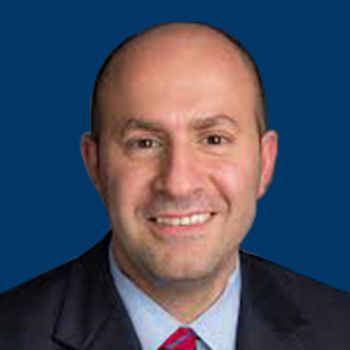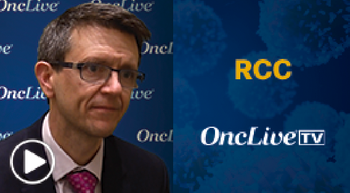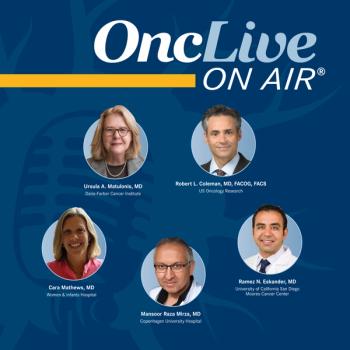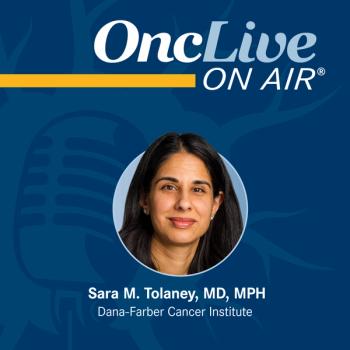
Jia Luo, MD, discusses the potential use of KB-0742 to target specific MYC-driven tumor types, as well as challenges in the detection of MYC amplification or overexpression in clinical practice.

Your AI-Trained Oncology Knowledge Connection!


Jia Luo, MD, discusses the potential use of KB-0742 to target specific MYC-driven tumor types, as well as challenges in the detection of MYC amplification or overexpression in clinical practice.

Sara M. Tolaney, MD, MPH, discusses key data from a final overall survival analysis of the phase 3 TROPiCS-02 trial in hormone receptor–positive, HER2-negative breast cancer.

Sacituzumab govitecan demonstrated an overall survival benefit vs physician's choice of treatment in patient with pretreated, endocrine-resistant, hormone receptor–positive, HER2-negative metastatic breast cancer.

The addition of atezolizumab to cabozantinib did not improve progression-free survival or overall survival vs cabozantinib alone in patients with advanced renal cell carcinoma who previously received treatment with an immune checkpoint inhibitor, missing the primary end points of the phase 3 CONTACT-03 trial.

The CAR T-cell therapy PHE885 produced responses and high minimal residual disease negativity rates with no new safety signals in patients with relapsed/refractory multiple myeloma.

Lakshimi Nayak, MD, discusses the diagnosis of patients with primary CNS lymphoma.

Several phase 3 studies conducted by researchers from Dana-Farber Cancer Institute show promising results for patients with rectal, brain, and kidney cancers.

Investigators at Dana-Farber Cancer Institute in Boston, Massachusetts, developed a clinical outreach program combining diagnostic and patient navigation services.

A telephone and web-based weight loss intervention was successful in helping patients with breast cancer who were overweight or obese lose weight—which can ultimately lead to improved outcomes.

For the 11th consecutive year, OncLive is honored to recognize oncology leaders whose innovations have contributed to immeasurable improvements in outcomes for countless patients.

People living with HIV remain at higher risk than people living without HIV for developing various cancers that can be treated with immune checkpoint inhibitors.

The addition of cabozantinib to nivolumab and ipilimumab led to improved progression-free survival vs nivolumab and ipilimumab alone in patients with treatment-naïve advanced renal cell carcinoma; however, the rate of grade 3/4 adverse effects with the triplet was 79%.

The combination of osimertinib and platinum-based chemotherapy led to a statistically significant and clinically meaningful improvement in progression-free survival compared with osimertinib alone in patients with locally advanced or metastatic non–small cell lung cancer harboring EGFR mutations.

A targeted kinase inhibitor added to a two-drug immunotherapy combination slowed the progression of advanced kidney cancer in previously untreated patients, according to research led by an oncologist from Dana-Farber Cancer Institute.

A new study published today in the New England Journal of Medicine found that for young women with hormone receptor-positive breast cancer, pausing endocrine therapy to pursue a pregnancy did not raise the short-term risk that the disease will recur.

In the open-label phase 2 LITESPARK-003 study, led by Dana-Farber Cancer Institute’s Toni Choueiri, MD, researchers investigated for the first time the combination of cabozantinib, a VEGF TKI, plus belzutifan, a HIF-2α inhibitor.

Bradley A. McGregor, MD, discusses the clinical significance of the updated COSMIC-021 data, how these findings support the continued investigation of IO/TKI combinations in non–clear cell renal cell carcinoma, and other efforts underway to better care for patients with varying histological subtypes of the disease.

Ursula A. Matulonis highlights previous data from the phase 3 ENGOT-OV16/NOVA trial initial readout and subsequent preplanned overall survival analysis, discusses new findings from the final analysis, and emphasizes how these data clarify some of the study’s limitations and reinforce the importance of adhering to the adjusted FDA label for niraparib in recurrent ovarian cancer.

In a new study in the journal Nature Cancer, Dana-Farber Cancer Institute scientists shed new light on the mechanism that raises and lowers PSMA expression in prostate cancer cells.

Bradley McGregor, MD, discusses the next steps for investigating cabozantinib plus atezolizumab in patients with advanced renal cell carcinoma.

Investigators of an ongoing phase 1a/1b multicohort trial are studying whether addition of adaptive immune activators increases the benefit derived from anti–PD-1 antibodies in multiple tumor types.

Christopher Lathan, MD, MS, MPH, discusses socioeconomical and clinical findings from a clinical outreach program incorporating cancer diagnostic services and patient navigation for patients from traditionally underserved populations.

Presenters from the 2023 SGO Annual Meeting share their insights on the treatment of patients with gynecologic cancers.

Research from Dana-Farber Cancer Institute looks at what happens before the emergence of mutations that interrupt cellular differentiation in colorectal cancer and finds not only evidence of fetal reprogramming that can initiate cancer, but also a protein, Sox9, that fuels that reprogramming.

Adagrasib induced high overall response rates in patients with KRAS G12C–mutated non–small cell lung cancer who achieved at least 90% mutation allele frequency clearance.

As the first clinical trial of the drug novobiocin is about to open for patients with cancers carrying BRCA gene mutations, new research at Dana-Farber Cancer Institute shows the drug poses a double threat to tumor cells.

Ursula A. Matulonis, MD, discusses common toxicities associated with mirvetuximab soravtansine-gynx, and how to properly manage these treatment-related adverse effects for patients with folate receptor alpha-high ovarian cancer.

Dana-Farber Cancer Institute researchers outline the complexities of colorectal cancer and the research needed to map out a path toward understanding it.

Ursula A. Matulonis, MD, discusses final overall survival results from the phase 3 NOVA trial in patients with ovarian cancer.

Dr Tolaney discusses the FDA approval of sacituzumab govitecan in patients with unresectable locally advanced or metastatic HR-positive, HER2-negative breast cancer; key data from the TROPiCS-02 trial; and how this agent can fulfill unmet needs for this patient population.